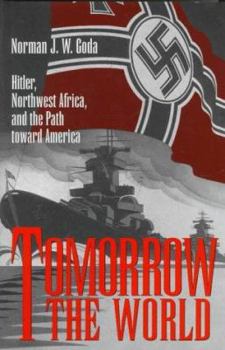Tomorrow the World: Hitler, Northwest Africa, and the Path Toward America
(Book #57 in the Texas A & M University Military History Series Series)
As early as the 1920s Adolf Hitler argued that his struggle for dominance would be worldwide. Before war began in Europe, Berlin had already placed contracts for a massive surface navy and four-engine... This description may be from another edition of this product.
Format:Hardcover
Language:English
ISBN:0890968071
ISBN13:9780890968079
Release Date:April 1998
Publisher:Texas A&M University Press
Length:352 Pages
Weight:1.95 lbs.
Dimensions:1.2" x 6.5" x 9.6"
Customer Reviews
3 ratings
Did Nazi Germany have designs on the U.S. long before WWII?
Published by Thriftbooks.com User , 19 years ago
Hitler sometimes seemed very conceited, tempestuous and irrational in his foreign policy decisions. Hubris always seemed to be at the forefront of Nazi strategic moves. Though, records demonstrate that the Nazis did not proceed without a cohesive plan or strategy. "We work in stages..." avowed Hitler, "we will not proceed in anarchy or without a plan." Goda's contention is that the Hitler and Nazi foreign policy formulations even in the 1920s and 1930s, anticipated a "global struggle." Gibraltar and the Canary Islands would have been strategically desirable as a German base of operations if only for a European theater of operations. However, Goda contends it was Hitler's Atlantic springboard to naval might, and preparations for a transatlantic campaign against the U.S. and North America. It should go without saying, but history tends to prove that Hitler expected no response on the part of France and Britain to the invasion of Poland. He thought their resolve was too weak to challenge him. In other words, the French and British declaration of war on Germany was a contingency the Germans did not account for in 1939. It was the contention of historian Richard Overy that Germany was seeking to become a superpower by the 1950s in his biography of Hermann Goering. So, Goda's thesis may have some truth to it. As a practical matter, after Nazi Germany was snowed in on the eastern front encountering heavy Soviet resistance after initial success, they quickly sought armistice with Vichy France. Thus, French North Africa for the most part remained unmolested. Vichy France stood ready to defend and affirm the sovereignty of its unoccupied territory and its colonial holdings. Frankly, the Italians had little success in forging through the Alps in their campaign against the French, much less against their colonies. Germany couldn't rely on the Italians to take the helm at fighting the French, so the 1940 Vichy-Axis armistice seemed natural and inevitable. Germany itself couldn't afford to divert resources to the task. Likewise, Germany couldn't divert resources to the acquisition of French North Africa at the time. It did not seek to agitate Vichy France, since a temporal peace was deemed requisite for fighting the British and the Soviets. Hitler did repeatedly demand concessions from Franco like a base of operations in Gibraltar and the Canary Islands, and demanded that Franco let SS units march through. Franco never would assent, because it would compromise Spain's neutrality. Spain endured a heavy toll from the 1930s war, and was ill equipped to fight against Britain and America. Spain despite having received military aid from Italy and Germany in the 1930s never proved to be a worthwhile ally of Nazi Germany. Francisco Franco hardly acquiesced in much if any of Hitler's wartime demands. He was more of an authoritarian anti-communist pragmatist than an ideologically pure fascist with the fanatic zeal of Hitler and Mussolini. Franco made some bold d
Interesting, but unfulfilled promises
Published by Thriftbooks.com User , 22 years ago
Norman Goda's book is interesting, however there is except for a chapter or two, very scant information about Hitler's intentions toward the United States. The book loses its focus in Hitler's convoluted aims toward Northwest Africa and just what he planned to do with those bases if he ever got them, is really never discussed. However, a previous reviewer is wrong, Hitler was never a decent military tactician, he was a horrible tactician. If his generals had always listened to what Hitler ordered, Germany would have lost the war a lot faster than it did, this wasn't a case of Hitler planning just for an eventuality. Goda is very persuasive in his contention that Hitler did have a goal to attack and eliminate the United States at least since 1927-28. Unfortunately, Goda only discusses the H Class ships and the Amerika bomber in passing and never provides any evidence of just what Hitler planned to do with the bases he wanted in any attack toward America.
Very good in-depth analysis of German strategy in NW Africa
Published by Thriftbooks.com User , 25 years ago
Notwithstanding discussion about the Germans putting long range bombers on the Azores, I'm not sure whether Goda actually proves that Hitler intended to use North African/Atlantic island bases to attack the US, since the evidence could be read to suggest that they would be primarily to defend territorial gains in Europe and Africa, still it is a very interesting book that I read all the way through. Much of it is diplomatic history illustrating the frustrations of the Germans in attempting to "square the circle" of securing the cooperation of three Mediterreanean powers: Italy, Spain, and Vichy France. Couldn't be done as they all had overlapping ambitions in the same regions of North Africa. One bit of news to this reader: Franco's Spain was at many times eager and willing to join the war on Germany's side, they just could never work out a satisfactory deal. I had thought Spain had always been reluctant to join the war.





